- solen.cz - Increasing the intake of the micronutrient selenium - utopia, fiction, providence or necessity?
- solen.cz - Micronutrients in old age
- pediatriepropraxi.cz - Vitamins and trace elements in newborns
- prolekare.cz - Trace elements in parenteral nutrition of preterm infants
What are the effects of selenium on the body? Where to find it? Symptoms of deficiency
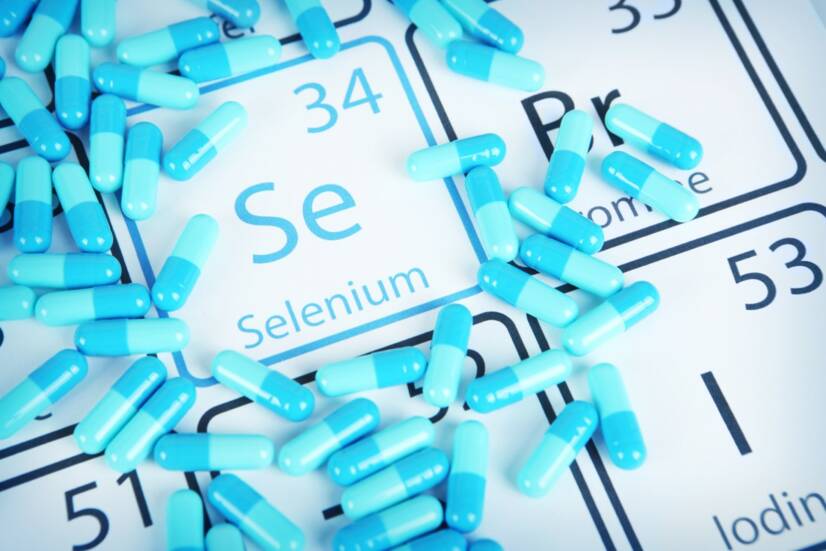
What are the effects of selenium on our bodies? Where can we find it? And what are the symptoms of a deficiency or excess?
Article content
We all remember selenium from chemistry as a chemical element in the periodic table of elements. It has the symbol Se and the proton number 34.
Do we know its effects on our bodies? How does its deficiency manifest itself and what are its natural sources, from what foods do we get it?
Selenium - Latin selenium
Did you know that...
It was discovered in 1818 by the Swedish chemist Berzelius.
It was named after the Greek moon goddess Selene.
For 140 years it was considered poisonous,
until 1957.
Schwartz and Foltz found that it has an essential role in the proper functioning of the human body.
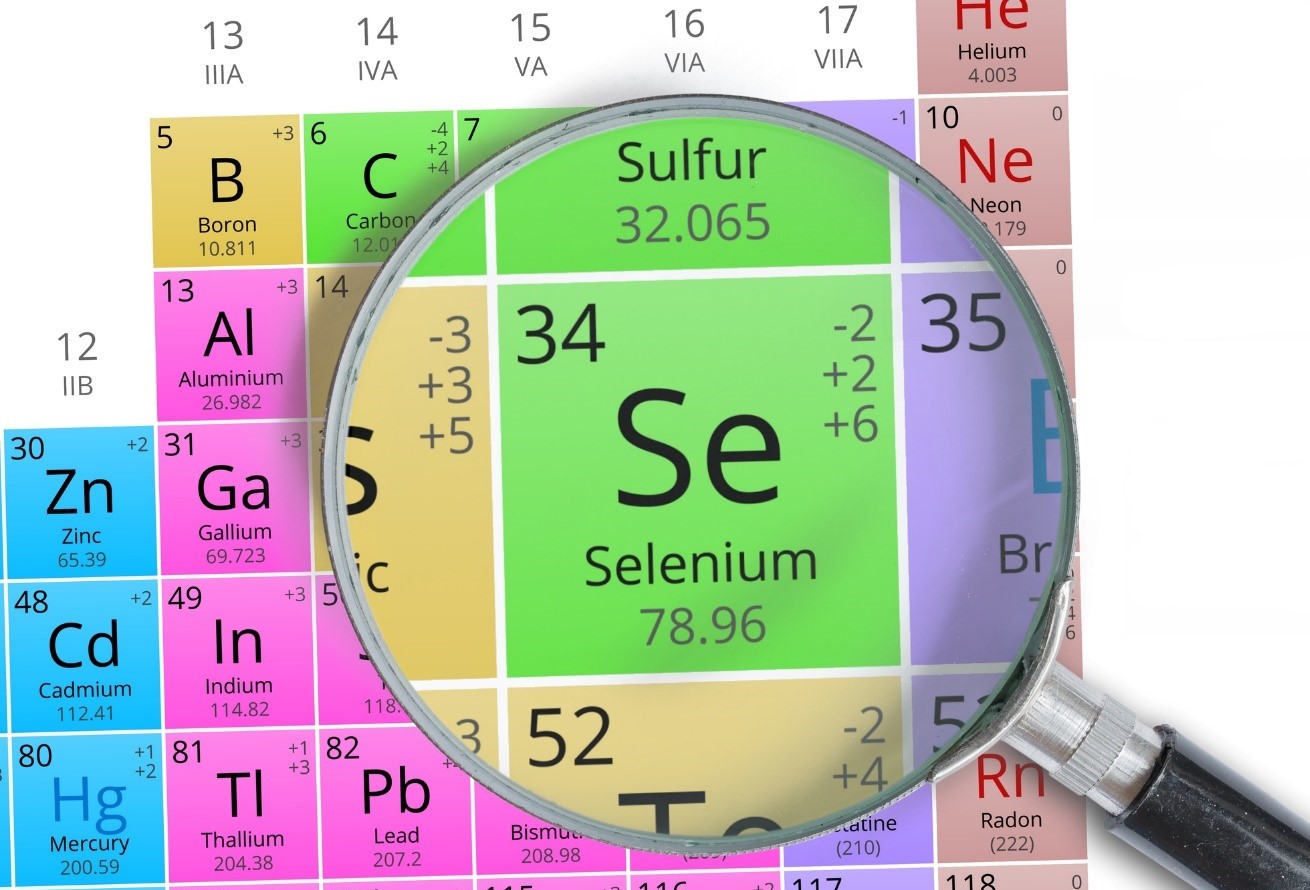
In nature, selenium occurs in two forms, namely inorganic and organic.
It enters our body in three forms:
- selenocysteine
- selenomethionine
- inorganic salts
The recommended daily dose of selenium is 55 µg.
The tolerated upper limit of daily intake for adults is 400 µg. The adult body contains 5-15 mg of selenium, which is bound to tissue proteins or found in the form of selenoproteins.
Selenoproteins are the functional form of selenium. They include the enzymes glutathione peroxidase, iodine-5-deiodinase, which protect cells from oxidation.
In the human body, about half of the total amount of selenium is collected in the liver. It is also found in the kidneys and thyroid gland. The level of selenium in the blood should be around 0.1 mg/l. Of this, 60% is in red blood cells and 40% in blood serum. Selenium is transported by the blood to all tissues of the body.
What are its effects?
- Strengthens the immune system
- Improves brain function
- Has antiviral effect
- Contributes to the prevention of various civilisation diseases
- Helps prevent cardiovascular diseases
- Forms part of antioxidant enzymes
- Improves fertility
- Slows aging
- Has anti-cancer effects
- Helps proper thyroid function
- Maintains healthy nails and hair
Previous research has shown that the effects of selenium depend on its concentration.
The estimated dose-dependent effects of selenium are given in the following table
| DOSE | EFFECT |
| 50-60 µg/day | optimum protective effect |
| 200-300 µg/day | antioxidant effects |
| 700-800 µg/day | inhibition of cancer cell growth |
| 1 500-5 000 µg/day | DNA damage and cell death |
In the following section we describe the different effects of selenium on the human body.
1. Immune system
Already in the 1980s, changes in the immunity of the human body were observed in relation to selenium levels. The resulting effect of selenium consists of several mechanisms.
The antioxidant effect of selenium is mediated by selenoproteins (glutathione peroxidase, thioredoxin reductase). These protect normal cells from the effects of oxidative stress, increased levels of which can induce various pathological changes.
What is oxidative stress?
Oxidative stress is defined as a condition in which the production of free radicals exceeds the antioxidant capacity of the human body.
Oxidative damage is both a cause and a consequence of many pathophysiological processes.
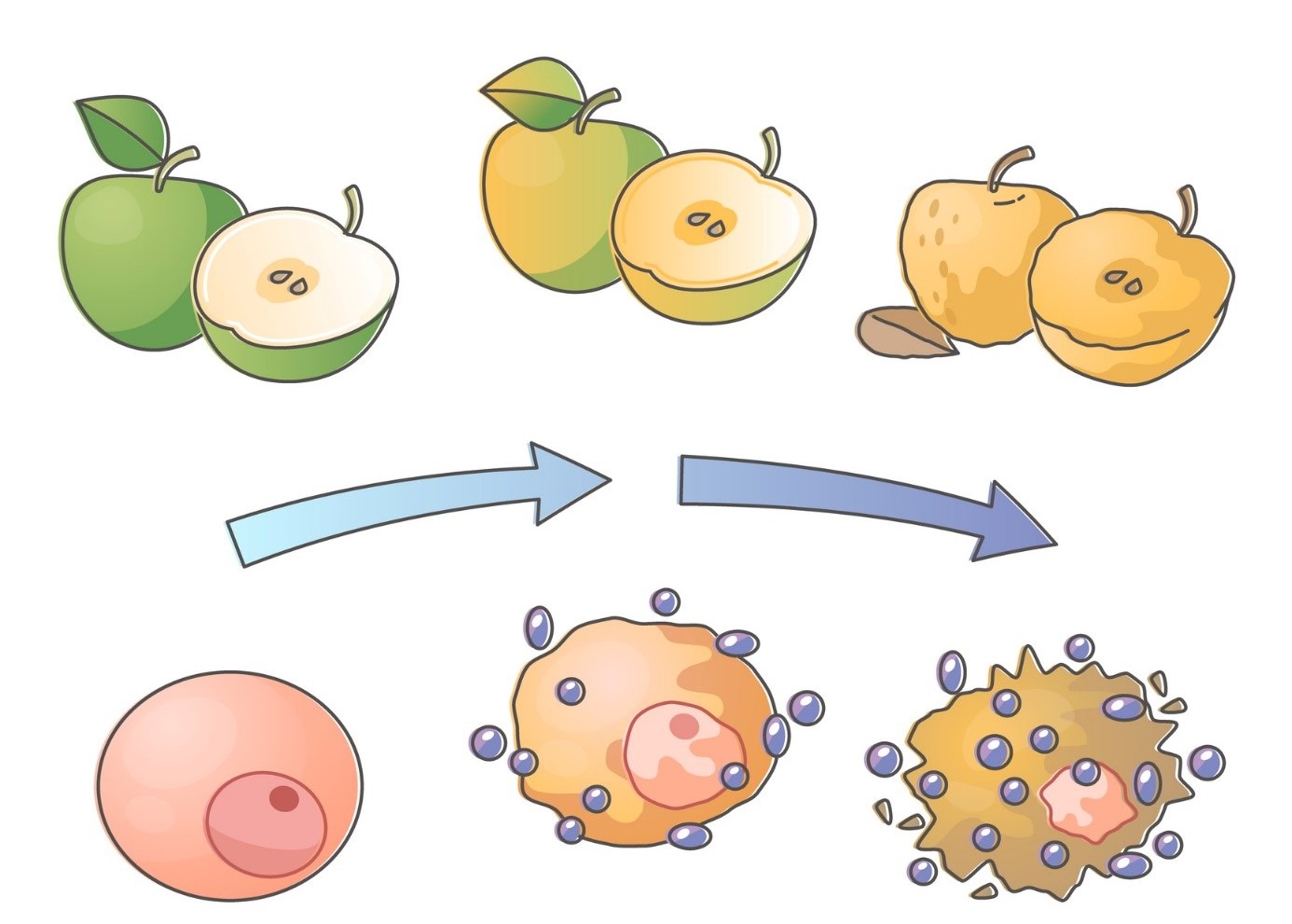
2. The thyroid gland
Selenium is found in the thyroid gland in the form of selenoproteins (0.2-2 µg/g of tissue). Selenoproteins include glutathione reductases, which have antioxidant activity. Their action consists in the scavenging of free radicals produced during the production of thyroid hormones.
In addition, selenium is a component of iodothyronine deiodinase molecules. These play an important role in the interconversion of various forms of thyroid hormones.
Low selenium levels (hyposelenia) are a risk factor for the development of thyroid nodules and nodules. Reduced selenium levels have also been noted in patients with Graves-Basedow disease.
Therefore, administration of selenium in the form of organic compounds has beneficial effects in patients with thyroidopathy.
It is mainly used in the supportive treatment of thyropathies.
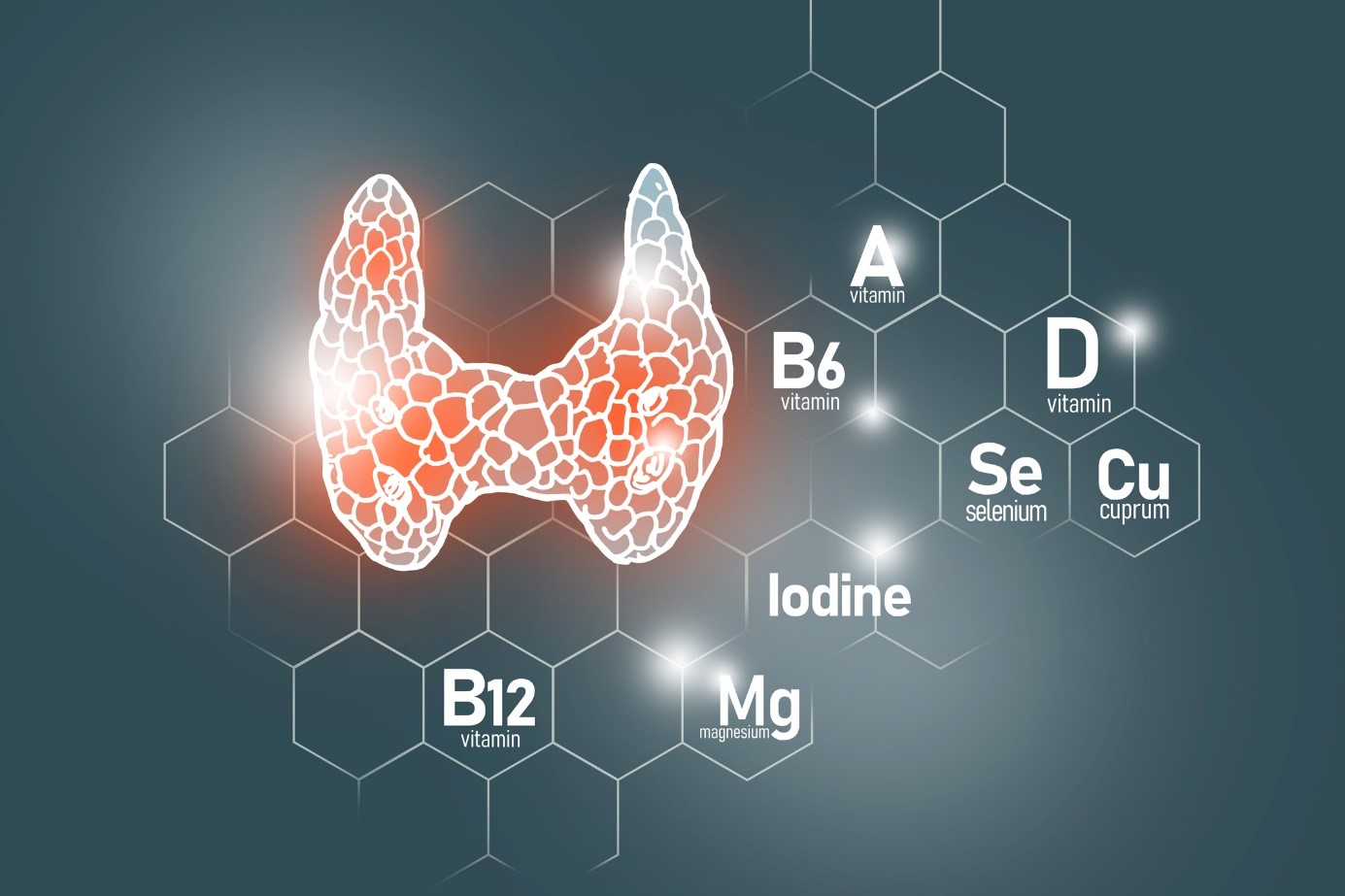
3. Oncological diseases
Scientists suggest that selenium may reduce the risk of cancer.
The mechanism of action is to specifically inhibit the growth of cancer cells. Selenium compounds could be beneficial in the treatment of colon, lung, breast and prostate cancer. Scientific studies show that they increase the effectiveness of certain drugs. For example, selenium supplementation in the form of selenic acid enhances the effects of doxorubicin and taxol.
Mechanisms of selenium's anti-cancer action include:
- protection against oxidative stress
- stimulation of DNA repair
4. Brain
A number of studies point to the indispensable role of selenium for proper brain function.
Here are some examples.
Selenium supplementation in children with epilepsy reduces the number of epileptic seizures.
Selenium deficiency is associated with accelerated onset of senility and cognitive decline.
+
Selenium deficiency in the body can cause increased incidence of depression, fear and hostile behaviour. The causes of these changes are not fully understood. One reason may be a change in neurotransmitter metabolism.
Another possibility may be better regulation of thyroid hormones, which are involved in regulating processes in the brain.
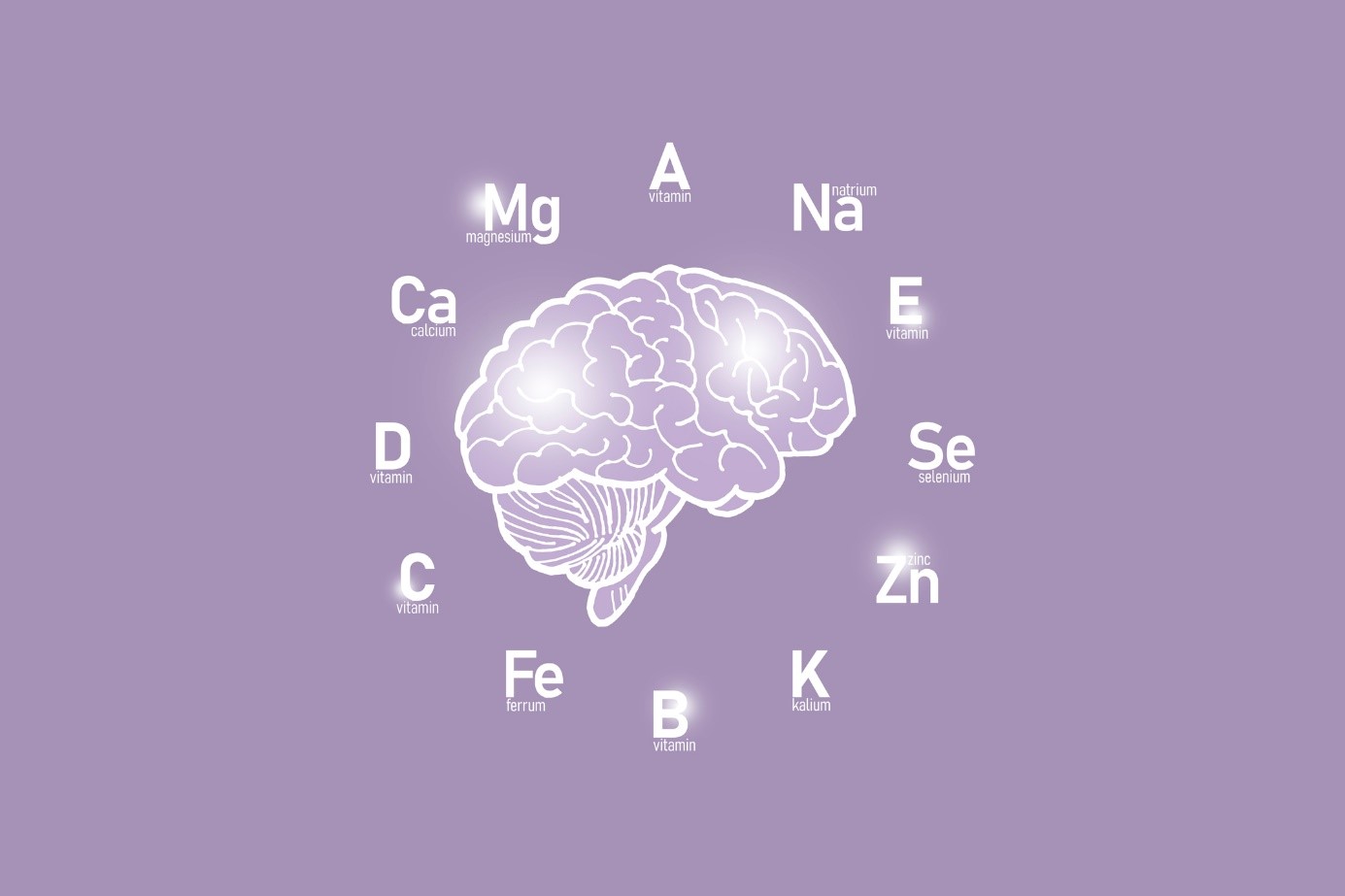
5. Reproductive health
From a reproductive point of view, selenium is very important for both sexes.
In men, selenium is essential for the formation and normal development of sperm. In men, two types of selenoproteins are important. The first type is found in the nucleus of the sperm and is important for sperm maturation. The second type of selenoprotein is found in the flagellum and protects sperm during their development.
During sperm maturation, the sperm polymerizes (clumping of basic substance molecules into large units) into a structural protein that is responsible for sperm motility.
Low levels of selenium have been found in women who miscarry in the first trimester of pregnancy. This is thought to be due to reduced antioxidant protection of the membranes.
6. Neonatal nutrition
We know that selenium is an important antioxidant.
It is very important for improving the function of the cells of the immune system. The recommended daily intake of selenium in parenteral and enteral nutrition of newborns is 5-10 µg/kg.
Selenium and its role in the nutrition of preterm infants
The intake of iron, zinc, iodine and selenium is very important in preterm neonates. We know that selenium is part of selenoenzymes, which are involved in antioxidant protection of the body.
Extremely immature newborns are at risk for a number of complications:
- bronchopulmonary dysplasia.
- retinopathy
- peri/intraventricular haemorrhage
- necrotizing enterocolitis
Selenium plays an important role in protection against infection (sepsis), in the synthesis of thyroid hormones and is also very important for growth and development.
Reduced selenium levels in premature infants are associated with myocardial disorders, erythrocyte macrocytosis, growth retardation, alopecia and nail bed disease.
Conversely, high doses of selenium may have pro-oxidant effects.
The recommended dose of selenium for intravenous administration to premature infants is 2 µg/kg/day. However, current evidence suggests that a dose of 3 µg/kg/day would be more appropriate to achieve the same selenium concentrations as in breastfed infants.
7. Selenium and its role in ageing
Minerals and vitamins play an important role in the proper functioning of biological processes.
The classical trace elements are iron, iodine, selenium and calcium. These elements are part of the protective systems throughout life and especially in the ageing period. During this period, the ability of cell renewal decreases, protein and DNA damage occurs, the antioxidant balance changes and many other reactions take place.
Ageing decreases selenium, zinc and magnesium levels. On the other hand, iron levels tend to be elevated in some pathological conditions (Alzheimer's disease).
Did you know that selenium can prevent tooth decay?
Selenium is also a very important antioxidant in dentistry. The most important organic component is collagen. In its bonds, selenium can replace sulphur. Such a bond is stronger than that of sulphur. According to studies, administration of selenium at a dose of 50 µg/day reduces the incidence of dental caries.
What foods can selenium be found in?
The highest levels of selenium are found in seafood and Brazil nuts.
Eating two Brazil nuts will cover your daily selenium requirement.
More than three Brazil nuts a day is not recommended.
Other sources of selenium include:
- cheese
- eggs
- legumes
- garlic
- pears
- wholemeal cereals

Most of the selenium in foods of animal origin is in the form of selenocysteine. In foods of plant origin, the selenium content of the soil or fertiliser used and its availability to the plant is usually the determining factor for selenium content.
There are areas in different parts of the country with different concentrations of selenium in soil. Medium concentrations of selenium are found in soils in Canada (except Ontario) and in much of the USA (especially in the Atlantic and Pacific coastal states).
Some European countries (Finland, Switzerland, Czech Republic, Slovakia) and New Zealand have very low concentrations of selenium in soil.
The recommended daily intake of selenium depends on geographical location.
Selenium absorption is improved if we have sufficient protein and vitamins A, E, C in the body.
Selenium absorption is reduced by higher intake of dietary fibre, zinc, cadmium and mercury.
What are the risk factors for low selenium levels?
- Older age
- Smoking
- Alcoholism
- Excessive coffee drinking
- excessive consumption of eggs and white rice
What can cause low selenium levels?
- Keshan disease - manifested by enlargement of the heart, weakening of the heart and muscle weakness; occurs only in the Keshan region of China
- Kashin-Beck disease - an endemic type of osteochondropathy occurring in parts of China, south-eastern Siberia and North Korea
- fertility disorders
- psychological disorders
- cataract
Have you heard of selenosis?
Selenosis is a condition in which we have excessive amounts of selenium in our bodies. It is caused by long-term intake of selenium above 400 µg per day.
Symptoms of selenium overdose include:
- garlicky smell in breath and sweat
- metallic taste in the mouth
- vomiting
- abdominal pain
- hair loss
- splitting of nails
- fatigue
How is selenium excreted from the body?
- Through the kidneys (60%)
- through faeces (35%)
- saliva (5%)
It is available in pharmacies...
It is available at the pharmacy in two forms: tablets and capsules.
Dietary supplements contain:
- organically bound selenium in selenium yeast - this form is considered the safest and best
- selenomethionine
- inorganic selenium in the form of sodium selenite and sodium selenite
Examples of combinations and effects in the table
| Combinations of selenium in dietary supplements | Effects |
| Selenium + zinc | Contributes to the maintenance of good eyesight, proper functioning of the immune system, protection of cells from oxidative stress and maintenance of healthy skin. |
| Coenzyme Q 10 + vitamin E + selenium | Involved in the production of energy in all body cells. Helps break down free radicals, protecting cells from damage and aging. |
| Zinc + selenium + echinacea | Helps support proper immune system function. Important for maintaining healthy hair and nails. Helps support normal respiratory system function. Supports physical and mental health. |
| Vitamin C + vitamin E + vitamin B6 + beta-carotene + zinc + selenium. | Contributes to proper cognitive function, DNA synthesis, maintaining healthy bones, healthy hair, nails and skin. Also contributes to maintaining good eyesight and proper immune system function. |
| Vitamin E + selenium + zinc | Contributes to the protection of cells from oxidative stress, proper thyroid function, as well as proper spermatogenesis and maintenance of healthy hair and nails. |
Interesting resources
Related










